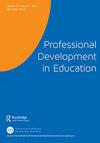Using professional learning to foster distributed leadership and equity of voice and promote higher quality in Early childhood education
IF 3.1
3区 教育学
Q1 EDUCATION & EDUCATIONAL RESEARCH
引用次数: 0
Abstract
ABSTRACT High-quality early childhood education (ECE) can improve children’s educational trajectories. However, the ECE field globally faces challenges that compromise its quality, with COVID-19 childcare closures further intensifying complexities. One solution to improve ECE working conditions is to use a distributed leadership framework to create professional learning opportunities that enhance staff interactions and equity of voice (staff input/investment). Limited research has explored this approach in relation to key outcomes like staff satisfaction, staff retention and classroom quality. The current study filled this gap by examining a job-embedded professional development initiative in the United States, Flamingo Early Learning (FEL). Using a distributive leadership framework, FEL was implemented in two cohorts of 18 ECE programme and 416 educators. Quantitative analyses of FEL online course data from 108 educators showed improvement in content knowledge. Classroom observation data from 64 educators revealed enhanced teacher-child interaction quality. Qualitative analyses of focus groups with 17 educators highlighted increased equity of voice, barriers to achieving the initiative’s goals and lingering effects of COVID-19. Findings were further examined in relation to staff role. Recommendations include using policy-driven initiatives to iteratively develop and evaluate professional learning models that promote distributed leadership and thereby greater ECE educator empowerment, satisfaction and practice.利用专业学习促进分散领导和公平发言权,提高幼儿教育质量
本文章由计算机程序翻译,如有差异,请以英文原文为准。
求助全文
约1分钟内获得全文
求助全文
来源期刊

Professional Development in Education
EDUCATION & EDUCATIONAL RESEARCH-
CiteScore
6.30
自引率
4.80%
发文量
27
 求助内容:
求助内容: 应助结果提醒方式:
应助结果提醒方式:


